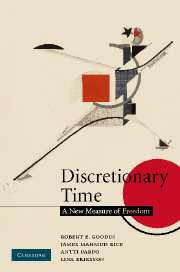Book contents
- Frontmatter
- Contents
- List of figures
- List of tables
- Preface
- Part I Introduction
- Part II Time pressure
- Part III Welfare regimes matter
- Part IV Gender regimes matter
- Part V Household regimes matter
- 13 How household regimes differ
- 14 The difference that household rules make
- 15 The difference that states make
- 16 Alternative household rules and temporal autonomy
- Part IV Conclusions
- Appendix 1 Methodology
- Appendix 2 Data
- Bibliography
- Index
15 - The difference that states make
Published online by Cambridge University Press: 28 October 2009
- Frontmatter
- Contents
- List of figures
- List of tables
- Preface
- Part I Introduction
- Part II Time pressure
- Part III Welfare regimes matter
- Part IV Gender regimes matter
- Part V Household regimes matter
- 13 How household regimes differ
- 14 The difference that household rules make
- 15 The difference that states make
- 16 Alternative household rules and temporal autonomy
- Part IV Conclusions
- Appendix 1 Methodology
- Appendix 2 Data
- Bibliography
- Index
Summary
To paraphrase Marx, households choose, but they do not choose on terms of their own choosing. What the differences are, between running your household on one set of rules versus some other, depends crucially upon choices made by your government and your larger society. Societies encourage some sorts of household choices and discourage others. States reward some household choices while penalizing others. The nature and magnitude of those rewards and penalties differ from one place to another, reflecting countries' varying preferences in these matters.
In this chapter, we attempt to quantify these effects. We try to assess the ways in which differing state policies either ameliorate or amplify the effects of a household's own choice over the rules on which it is to be run.
How differences are made: policy instruments and social norms
To some extent, choices among ‘household rules’ are more consequential in some places rather than others – and in any given place, some choices are more consequential than others – simply because of social norms and conventions concerning what people in certain sorts of households are ordinarily expected to do.
All of the standards of ‘necessity’ that we have been using here are socially relative. How much income we say you need is specified by reference to the poverty line, which (as we define it) is relative to the incomes of everyone else in your country.
- Type
- Chapter
- Information
- Discretionary TimeA New Measure of Freedom, pp. 239 - 253Publisher: Cambridge University PressPrint publication year: 2008

